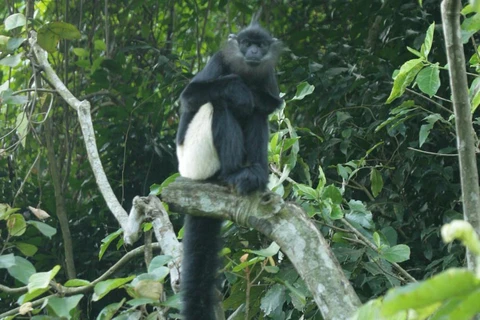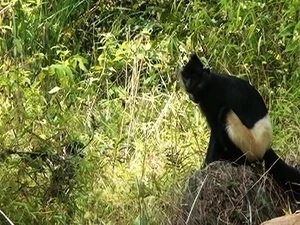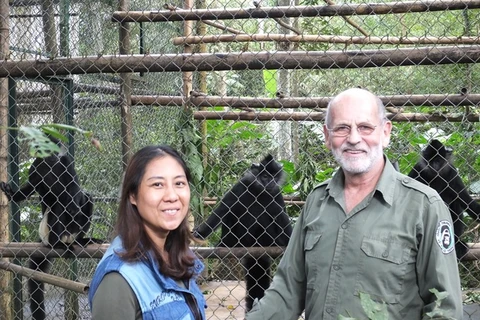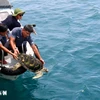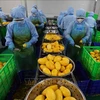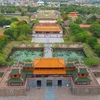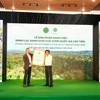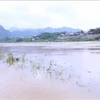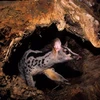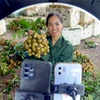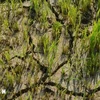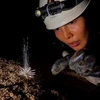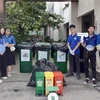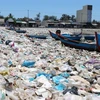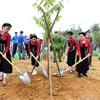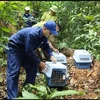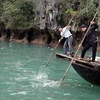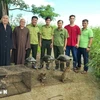 Do Dang Khoa, a staff member of the centre, is “talking” with a brown-shanked douc langur. The brown-shanked douc langur is considered the "queen" of primates. (Photo: VietnamPlus)
Do Dang Khoa, a staff member of the centre, is “talking” with a brown-shanked douc langur. The brown-shanked douc langur is considered the "queen" of primates. (Photo: VietnamPlus) Hanoi (VNA) - The Endangered Primate Rescue Centre (EPRC) of the Cuc Phuong National Park in the northern province of Ninh Binh, which is run by enthusiastic experts for nearly 30 years, is home to 178 primates representing 14 endangered and rare species.
“Special house” of primates
The Endangered Primate Rescue Centre is a non-profit project dedicated to the rescue, rehabilitation, breeding, research and conservation of Vietnam’s endangered and critically endangered primate species. Established in 1993, through collaboration between the Frankfurt Zoological Society and the Cuc Phuong National Park, the centre is presently managed under the umbrella of the Vietnam Primate Conservation Programme, jointly operated by the Zoo Leipzig and the Cuc Phuong National Park.
The primary function of the Endangered Primate Rescue Centre is to provide rescue and rehabilitation to endangered and critically endangered primates that have been confiscated from illegal wildlife trading cases. It has established captive populations of highly endangered primate species, with the final aim to reintroduce and release these animals as stable family groups into well-protected natural areas.
It is also the first establishment in Indochina and Vietnam specializing in research and conservation of primates.
The primates are bred in more than 50 large cages, including two fenced semi-wild areas of primary forest. These enclosures are used to prepare animals for release into the wild and provide opportunities to study the behaviour of animals in semi-wild conditions.
Veterinary workers in the centre have decided to follow the "order from the heart", spending their youth on rescuing, rehabilitating, and taking care of the most rare and precious wild animals in Vietnam.
Tran Quang Phuong who began working at the conservation centre in 2000 and used to be a manager of small carnivore and pangolin conservation programme. He is the coordinator of a project to protect precious and rare primate species in Vietnam.
Phuong said that with an area of 3.5 hectares, the Endangered Primate Rescue Centre has about 50 large cages, helping species to live in a close-to-nature environment.
The centre is currently breeding 178 primate individuals representing 14 precious and rare species. Most of them were rescued from illegal wildlife trading cases. Many of them were injured seriously.
However, after only a short time being cared for at the centre, most of the primates have gradually recovered. They are very friendly with their "nannies" – veterinarians who are taking care of the animals.
Along with the rescue and care work, the centre has successfully released hundreds of primates back to the wild. As many as 12 primate individuals have been reintroduced into the wild so far this year.
Up to 166 primate individuals of 10 species have been born in semi-wild areas of the centre.
The centre has successful run breeding programmes for some of the world’s rarest primate species – the Cat Ba langur, Delacour’s langur, grey-shanked douc langur, Ha Tinh langur and other highly endangered species.
The centre has also carried out education programme and research activities. More than 20 Master and PhD theses are produced in co-operation with universities in Vietnam and abroad. This has led to the publication of more than 100 scientific papers.
The primates of Vietnam remain under intense pressure from hunting and habitat fragmentation. These primates require specific care without which they will deteriorate rapidly and eventually die. The EPRC works alongside local government agencies, NGOs and communities to rescue these animals, thus removing them from a life-threatening situation and improving their chances of survival by providing the appropriate care. The rehabilitation of these primates is a long process by which the centre actively manages rescued primates towards regaining the health and skills required to live as self-sufficiently as possible.
The centre now has 29 staff members both from the local community and abroad. The main financial sources are from international organisations and zoos./.


